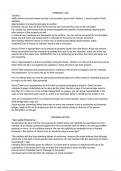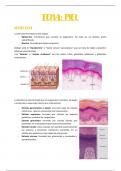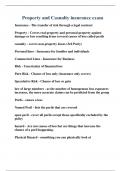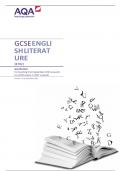CRIMINAL LAW
Tutorial 1:
ANS1a)Actus rea and means rea has to be proved to prove theft. Section 1, person guilty of theft
defnition.
Appropriation of property belonging to another.
However, the act was not there as he took his own coat and thus can not be convicted.
For means rea, dishonesty must be proved alongside the intention of permanently depriving the
other person of the property as well.
In criminal law, intentions are interpreted by the actions. You can not be convicted for evil thoughts.
Actus rea and mens rea always need to coincide for the person to convict someone.
Strict liability offences require no mens rea,i.e drinking and sitting behind wheels, traf c
violations.Even if theres no intention, there is still a conviction.
Ans1b) There is appropriation as he steals the property (book) from the library. Actus rea present.
Mens rea present from the moment he realises the book is not his, However, actus and mens rea
need to be at the same time. HOWEVER, this is a continuing act and thus the mens and actus rea
are coinciding.
Ans1c) Appropriation is done by actually moving the fence. Section 4(2) tells us that land can not be
stolen.She can le a suit against her neighbour. Actus and mens rea both present.
Ans1d) Wild creatures are property,tamed or untamed. If the animal is trapped,it can be “reduced
into possession” so no actus rea as no theft occurred.
Ans 1e) Money/theft not used for personal/commercial gains but rather used for charitable purposes
so might not be theft. About property.
Ans1f)There is an appropriation as the ticket is property belonging to another. Does he have
intention to keep it inde nitely as he returned the ticket. Section 6 says if the percentage used is
less than 50% than it is not an outright taking/theft. In essays, you can argue hypotheticals in the
case of how important each match is, which is an important factor in deciding if its a theft or not.
2)An act is required to term it an assault,omission can not be assault. James J said it was omission
while bridge said it was not.
Actus rea was committed when there was no mens rea however it was a continuing act.However,
bridge J said he did not do anything as the car was simply resting on the foot of the person.
He left ignition on though.
READING NOTES
THE HARM PRINCIPLE:
As described by john mill,’the only purpose for which power can rightfully be exercised over any
member of a civilised community against his will is to prevent harm to others. His own good,either
physical or moral, is not suf cient warrant. He can not rightfully be compelled to do or forbear..
because in the opinion of others to do so would be wise or even right.’
This clashes with the long-standing debate of autonomy, however the state believes that although
autonomy is the right of every person their autonomy can not interfere with the autonomy of others.
Case;gough v dpp.
Feinberg Strict de nition given for offence, it is more than a concern or disproval and has to be
substantive in the sense that it has to shake the conscience or seem morally incorrect.
Future harms? Potential harms? Damage to the public?
Are these harms that fall within the category of ‘harm principle’?
fi fi fi fi fi
,What if an activity that is enjoyed by some but could be non-consensual and harmful for others i.e
smoking in public or prostitution? Dif cult to decide however the percentage of those who enjoy and
those who do not has to be weighed in and it has to be seen whether that activity is of social bene t.
An activity can not be criminalised simply because it is regarded as immoral. To use the law to
impose moral value is called moralism.
Anthony duff argument is that criminal law should involve a ‘moral conversation’ with a criminal in an
attempt to reform his thinking and reconciling him with the ones he wronged.
Moralism is at the heart of criminal law as the role of criminal law is to maintain a good moral
standing of the community by forbidding the wrong vices and encouraging the good vices.
Practicality:
Whether criminalising certain things will actually be practical i.e will people follow and obey the law?
If few people obey it, making others obey it will be a strain on resources and will also bring the law
into disrepute. For example alcohol was banned in united states but no one complied with this law.
Another interesting argument is that the rebellious nature of people will threaten the practicality of
the law as criminalising certain things will lead them to do it again.
When is criminalisation required?
State may punish is diff from state must punish.modern legislations tend to over criminalise rather
than under criminalise.
Can the issue at hand be solved without needing to criminalise the issue? Will abolishing capital
punishment of rape and introducing education programs solve the problem and if it does, will that be
preferred?
State has a duty of care to criminalise things which harm society vs in cases of doubt favour liberty
principle (in dubio pro liberate)
Culpability:
For a crime, it is normally not enough to show that the offender caused harm to another; it must also
be shown that the defendant was blameworthy in harming the other person. The defendant must be
responsible for the harm and this is proven in one way by showing that the defendant was capable
of acting differently from the way he did.
SIGNIFICANCE OF HUMAN RIGHTS ACT 1998
Designed to ensure the protection of individuals rights under the ECHR. Protects the rights in the
ECHR in two main ways:
1)section 3 requires judges to interpret legislation in a way which complies with the ECHR so far as
is possible. It states ‘so far as it is possible to do so, primary legislation and subordinate legislation
must be read and given effect in a way which is compatible with the convention rights.’
If court cant interpret a statute in line with convention rights it must issue a declaration of
incompatibility and consequently parliament will need to consider whether the legislation needs to
be amended.
2) section 6 requires public authorities to act in a way which is compatible with the convention rights.
How does HRA affect criminal law?
Certainty: state is permitted under ECHR to create criminal offences which interfere with citizens’
convention rights, such as rights to private and family life but only if the interferences are in
accordance with a law.
A rule can be a law only if it is de ned with suf cient precision to enable the citizen to know how to
behave in accordance with the law.
Cases:tagg,steel v uk, hashman and harrup v uk.
Law cant be too vague as otherwise it will be up to the courts to interpret criminal law rather than
parliament.
Burden of proof:
fi fi fi fi
, Lord sankey in woolmington v dpp said ‘throughout the web of the english criminal law one golden
thread is always to be seen - that it is the duty of the prosecution to prove the defendants guilt.’
Thought behind this statement is that consequences of conviction are so severe that the state
prefers to run the risk of acquitting people who may have indeed committed the offence rather than
convicting people for offences they may never have done. The state provides full cooperation with
the claimants and provides resources to prove the defendant guilty but the defendant starts off with
an innocent level.
This is not what really happens though. Pg 42 for stats.
Strict-liability offences (where it is necessary to prove only that the defendant caused a particular
result or state of affairs and it is not required to show that the defendant had a particular state of
mind or behaved unreasonably.
Presumption of innocence statute is not followed very strictly. Cases: salabiaku v france and phillips
v uk.
House of lords in kebelline case held that the key issue was the difference between persuasive and
evidential burdens of proof;
1)a persuasive burden of proof means that the party must prove the matter at issue.
2)an evidential burden of proof means that the party must introduce suf cient evidence to establish
the reasonable possibility that a particular issue is true.
For example, if d faces a charge of assault and wants to prove he was acting under duress,D has an
evidential burden of establishing some evidence that he indeed was acting under duress. If some
evidence is shown, it is now the prosecution that has the persuasive burden of proof of showing
beyond reasonable doubt that the defendant was not acting under duress.
House of lords held that reverse burdens of proof were more likely to be compatible with article 6 if
they were evidential rather than persuasive burdens. A persuasive burden will only be justi able if it
involves an issue which is easy for the defendant to establish.
Impact of HRA on particular offenses: cases listed page 46.
Critical criminal law:
Critical race theories: this seeks to show how the law can re ect and perpetuate racial hierarchies.
There is no doubt that there are serious issues around race and the criminal justice system.
Black people had highest stop and search incidents in all areas where data is available and the ‘ nd
rate’ of drugs was lower on black people then white people which might suggest to us how police
might have weaker grounds for suspicion rather than those on white people.
Arrest rates also higher for minority ethnic groups. Other stats listed on page 50.
One place where you will nd less racist behaviour is when convictions are dealth with judges and
juries where it is imperative for them to act fairly and not let any bias unfold.
Feminist legal thought:
Less representation of women on the police forces. Less conviction of crimes committed against
women. Many women in prison were coerced into committing those crimes, they also experience
lots of harassment and sexual abuse which is not reported.
Punishment:
What is punishment? Dif cult to de ne but contains some of the following elements:
1) it must be unpleasant.
2) It is in icted by the state.
3) It is imposed on those who break the law.
4) Its purpose is not to compensate the victim.
5) It carries censure of what the defendant did.
fl fi fi fi fl fi fi fi
Tutorial 1:
ANS1a)Actus rea and means rea has to be proved to prove theft. Section 1, person guilty of theft
defnition.
Appropriation of property belonging to another.
However, the act was not there as he took his own coat and thus can not be convicted.
For means rea, dishonesty must be proved alongside the intention of permanently depriving the
other person of the property as well.
In criminal law, intentions are interpreted by the actions. You can not be convicted for evil thoughts.
Actus rea and mens rea always need to coincide for the person to convict someone.
Strict liability offences require no mens rea,i.e drinking and sitting behind wheels, traf c
violations.Even if theres no intention, there is still a conviction.
Ans1b) There is appropriation as he steals the property (book) from the library. Actus rea present.
Mens rea present from the moment he realises the book is not his, However, actus and mens rea
need to be at the same time. HOWEVER, this is a continuing act and thus the mens and actus rea
are coinciding.
Ans1c) Appropriation is done by actually moving the fence. Section 4(2) tells us that land can not be
stolen.She can le a suit against her neighbour. Actus and mens rea both present.
Ans1d) Wild creatures are property,tamed or untamed. If the animal is trapped,it can be “reduced
into possession” so no actus rea as no theft occurred.
Ans 1e) Money/theft not used for personal/commercial gains but rather used for charitable purposes
so might not be theft. About property.
Ans1f)There is an appropriation as the ticket is property belonging to another. Does he have
intention to keep it inde nitely as he returned the ticket. Section 6 says if the percentage used is
less than 50% than it is not an outright taking/theft. In essays, you can argue hypotheticals in the
case of how important each match is, which is an important factor in deciding if its a theft or not.
2)An act is required to term it an assault,omission can not be assault. James J said it was omission
while bridge said it was not.
Actus rea was committed when there was no mens rea however it was a continuing act.However,
bridge J said he did not do anything as the car was simply resting on the foot of the person.
He left ignition on though.
READING NOTES
THE HARM PRINCIPLE:
As described by john mill,’the only purpose for which power can rightfully be exercised over any
member of a civilised community against his will is to prevent harm to others. His own good,either
physical or moral, is not suf cient warrant. He can not rightfully be compelled to do or forbear..
because in the opinion of others to do so would be wise or even right.’
This clashes with the long-standing debate of autonomy, however the state believes that although
autonomy is the right of every person their autonomy can not interfere with the autonomy of others.
Case;gough v dpp.
Feinberg Strict de nition given for offence, it is more than a concern or disproval and has to be
substantive in the sense that it has to shake the conscience or seem morally incorrect.
Future harms? Potential harms? Damage to the public?
Are these harms that fall within the category of ‘harm principle’?
fi fi fi fi fi
,What if an activity that is enjoyed by some but could be non-consensual and harmful for others i.e
smoking in public or prostitution? Dif cult to decide however the percentage of those who enjoy and
those who do not has to be weighed in and it has to be seen whether that activity is of social bene t.
An activity can not be criminalised simply because it is regarded as immoral. To use the law to
impose moral value is called moralism.
Anthony duff argument is that criminal law should involve a ‘moral conversation’ with a criminal in an
attempt to reform his thinking and reconciling him with the ones he wronged.
Moralism is at the heart of criminal law as the role of criminal law is to maintain a good moral
standing of the community by forbidding the wrong vices and encouraging the good vices.
Practicality:
Whether criminalising certain things will actually be practical i.e will people follow and obey the law?
If few people obey it, making others obey it will be a strain on resources and will also bring the law
into disrepute. For example alcohol was banned in united states but no one complied with this law.
Another interesting argument is that the rebellious nature of people will threaten the practicality of
the law as criminalising certain things will lead them to do it again.
When is criminalisation required?
State may punish is diff from state must punish.modern legislations tend to over criminalise rather
than under criminalise.
Can the issue at hand be solved without needing to criminalise the issue? Will abolishing capital
punishment of rape and introducing education programs solve the problem and if it does, will that be
preferred?
State has a duty of care to criminalise things which harm society vs in cases of doubt favour liberty
principle (in dubio pro liberate)
Culpability:
For a crime, it is normally not enough to show that the offender caused harm to another; it must also
be shown that the defendant was blameworthy in harming the other person. The defendant must be
responsible for the harm and this is proven in one way by showing that the defendant was capable
of acting differently from the way he did.
SIGNIFICANCE OF HUMAN RIGHTS ACT 1998
Designed to ensure the protection of individuals rights under the ECHR. Protects the rights in the
ECHR in two main ways:
1)section 3 requires judges to interpret legislation in a way which complies with the ECHR so far as
is possible. It states ‘so far as it is possible to do so, primary legislation and subordinate legislation
must be read and given effect in a way which is compatible with the convention rights.’
If court cant interpret a statute in line with convention rights it must issue a declaration of
incompatibility and consequently parliament will need to consider whether the legislation needs to
be amended.
2) section 6 requires public authorities to act in a way which is compatible with the convention rights.
How does HRA affect criminal law?
Certainty: state is permitted under ECHR to create criminal offences which interfere with citizens’
convention rights, such as rights to private and family life but only if the interferences are in
accordance with a law.
A rule can be a law only if it is de ned with suf cient precision to enable the citizen to know how to
behave in accordance with the law.
Cases:tagg,steel v uk, hashman and harrup v uk.
Law cant be too vague as otherwise it will be up to the courts to interpret criminal law rather than
parliament.
Burden of proof:
fi fi fi fi
, Lord sankey in woolmington v dpp said ‘throughout the web of the english criminal law one golden
thread is always to be seen - that it is the duty of the prosecution to prove the defendants guilt.’
Thought behind this statement is that consequences of conviction are so severe that the state
prefers to run the risk of acquitting people who may have indeed committed the offence rather than
convicting people for offences they may never have done. The state provides full cooperation with
the claimants and provides resources to prove the defendant guilty but the defendant starts off with
an innocent level.
This is not what really happens though. Pg 42 for stats.
Strict-liability offences (where it is necessary to prove only that the defendant caused a particular
result or state of affairs and it is not required to show that the defendant had a particular state of
mind or behaved unreasonably.
Presumption of innocence statute is not followed very strictly. Cases: salabiaku v france and phillips
v uk.
House of lords in kebelline case held that the key issue was the difference between persuasive and
evidential burdens of proof;
1)a persuasive burden of proof means that the party must prove the matter at issue.
2)an evidential burden of proof means that the party must introduce suf cient evidence to establish
the reasonable possibility that a particular issue is true.
For example, if d faces a charge of assault and wants to prove he was acting under duress,D has an
evidential burden of establishing some evidence that he indeed was acting under duress. If some
evidence is shown, it is now the prosecution that has the persuasive burden of proof of showing
beyond reasonable doubt that the defendant was not acting under duress.
House of lords held that reverse burdens of proof were more likely to be compatible with article 6 if
they were evidential rather than persuasive burdens. A persuasive burden will only be justi able if it
involves an issue which is easy for the defendant to establish.
Impact of HRA on particular offenses: cases listed page 46.
Critical criminal law:
Critical race theories: this seeks to show how the law can re ect and perpetuate racial hierarchies.
There is no doubt that there are serious issues around race and the criminal justice system.
Black people had highest stop and search incidents in all areas where data is available and the ‘ nd
rate’ of drugs was lower on black people then white people which might suggest to us how police
might have weaker grounds for suspicion rather than those on white people.
Arrest rates also higher for minority ethnic groups. Other stats listed on page 50.
One place where you will nd less racist behaviour is when convictions are dealth with judges and
juries where it is imperative for them to act fairly and not let any bias unfold.
Feminist legal thought:
Less representation of women on the police forces. Less conviction of crimes committed against
women. Many women in prison were coerced into committing those crimes, they also experience
lots of harassment and sexual abuse which is not reported.
Punishment:
What is punishment? Dif cult to de ne but contains some of the following elements:
1) it must be unpleasant.
2) It is in icted by the state.
3) It is imposed on those who break the law.
4) Its purpose is not to compensate the victim.
5) It carries censure of what the defendant did.
fl fi fi fi fl fi fi fi









